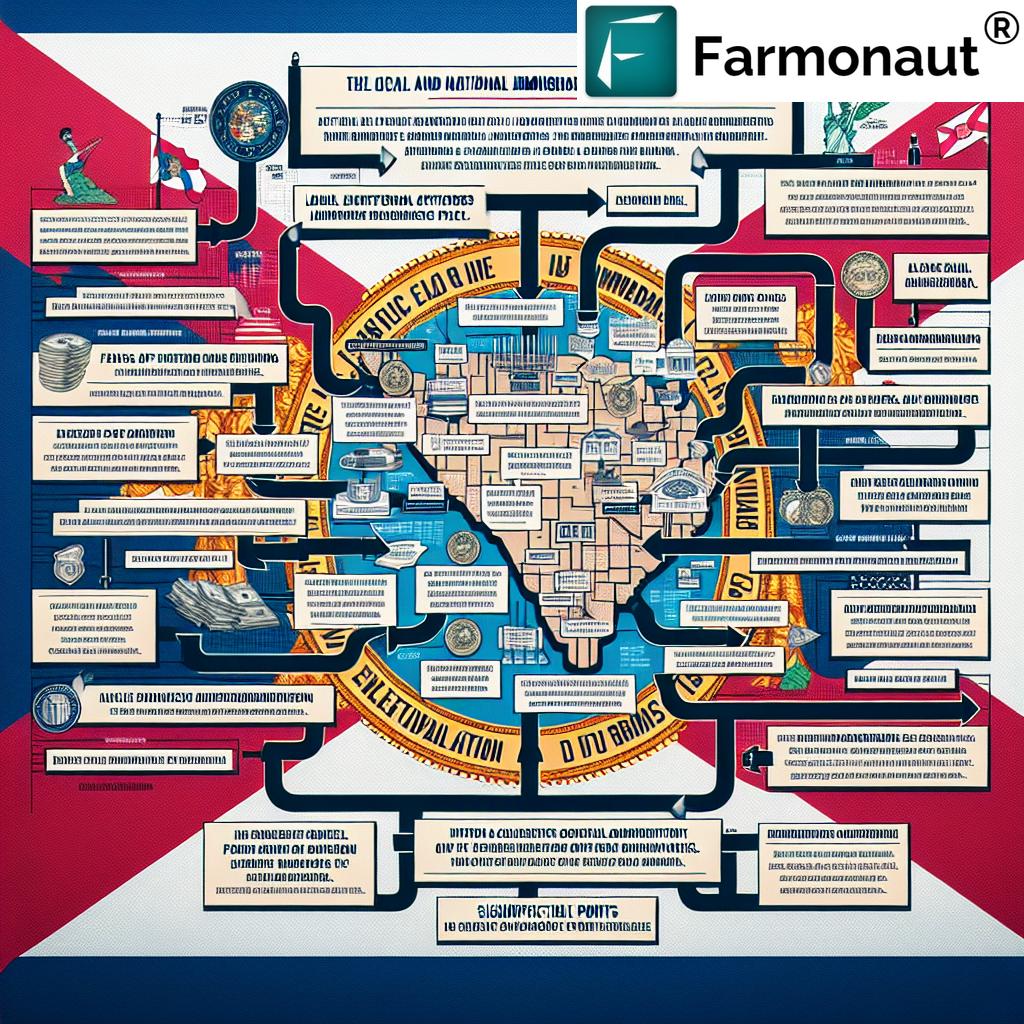Florida’s Immigration Standoff: Analyzing the Impact of Proposed Legislation on Agriculture and Economy
“Florida’s proposed immigration bill could affect over 772,000 undocumented immigrants, about 3.6% of the state’s population.”
In the heart of the Sunshine State, a political storm is brewing. Florida’s immigration landscape is on the brink of a seismic shift as Governor Ron DeSantis announces his intention to veto a controversial immigration bill recently passed by the Republican-controlled legislature. This clash between state leadership and lawmakers has ignited an intense debate, highlighting the complexities of immigration enforcement and policy in our nation.
As we delve into this pressing issue, we at Farmonaut recognize the significant implications this legislation could have on Florida’s agricultural sector and broader economy. Our mission to make precision agriculture accessible to farmers worldwide drives us to analyze how such policy changes might affect the farming community and the state’s economic landscape.

The Proposed Legislation: A Deep Dive
The bill at the center of this controversy allocates approximately $500 million to enhance collaboration between state/local law enforcement and federal agencies. Its primary objectives include:
- Imposing harsher criminal penalties on immigrants in the country illegally who commit crimes
- Strengthening coordination between state and federal immigration enforcement
- Ceding immigration oversight to the state’s agriculture commissioner
However, this last point has become a major bone of contention, with Governor DeSantis strongly opposing it, likening it to placing the “fox in charge of the hen house.” This metaphor underscores the governor’s concerns about potential conflicts of interest in immigration enforcement.
The Governor’s Stance
In a series of roundtable discussions and social media posts, Governor DeSantis has made his position clear. He emphasizes the need for Florida to maintain the strongest immigration enforcement laws in the nation, labeling the proposed bill as “watered-down.” The governor’s primary concerns include:
- The potential creation of a “de facto sanctuary state”
- Weakening of current immigration enforcement measures
- Misalignment with his vision of stringent immigration control
DeSantis has gone so far as to criticize some Republican leaders for siding with Democrats on this issue, urging conservative voters to hold their elected representatives accountable regarding immigration policies.
Legislative Divide and Political Implications
The announcement of a potential veto has sent ripples through Florida’s political landscape. The question now looms: can the Republican-majority legislature muster enough votes to override DeSantis’ veto? Early indicators suggest a lack of cohesion within the party, with some GOP members who initially supported the bill now expressing regret.
Representative John Temple’s statement that he would not support efforts to override the veto if it came to fruition exemplifies this growing divide. This internal party conflict reflects the broader national debate on immigration policy and enforcement.
Democratic Opposition and Human Impact
On the other side of the aisle, Democratic lawmakers have raised significant objections during legislative debates. Their concerns center around:
- A provision denying in-state tuition to undocumented students, potentially affecting approximately 6,500 students in Florida
- The rushed nature of various provisions
- The perceived lack of compassion in the bill’s approach to immigration
While some Democrats expressed willingness to support the bill if the tuition issue was amended, others criticized the overall punitive nature of the legislation. This highlights the ongoing struggle to balance enforcement with humanitarian considerations in immigration policy.
The TRUMP Act: Controversy in Name and Substance
The bill, dubbed the TRUMP Act, moved through the legislature largely along party lines, with several Republicans dissenting, including some of DeSantis’ allies. House and Senate leaders argue that they worked closely with the Trump administration to amend the bill while resisting some of DeSantis’ more stringent proposals.
One such proposal that faced resistance was the establishment of a legal presumption that undocumented individuals are flight risks. This aspect of the debate underscores the tension between hardline enforcement strategies and more moderate approaches within the Republican party.
“The agriculture industry in Florida, worth $7.6 billion annually, relies heavily on immigrant labor, with up to 70% being undocumented.”
Impact on Florida’s Agriculture and Economy
As we at Farmonaut focus on empowering farmers with cutting-edge technology, we cannot overlook the potential impact of this legislation on Florida’s agricultural sector. The state’s agriculture industry, valued at $7.6 billion annually, heavily relies on immigrant labor. With up to 70% of this workforce potentially being undocumented, the proposed legislation could have far-reaching consequences.
| Economic Sector | Current Contribution | Projected Impact |
|---|---|---|
| Agriculture | $7.6 billion annually | Potential 30-50% reduction in labor force |
| Construction | $55.4 billion annually | 15-25% workforce reduction |
| Hospitality | $111.7 billion annually | 10-20% decrease in service capacity |
| Healthcare | $120 billion annually | 5-10% shortage in support staff |
| State GDP | $1.1 trillion | Potential 2-4% decrease |
| Tax Revenue | $40 billion annually | Projected 3-6% reduction |
| Job Market | 10.8 million jobs | Estimated 100,000-200,000 job vacancies |
The potential economic repercussions extend beyond agriculture:
- Labor shortages in key industries like construction and hospitality
- Increased production costs potentially leading to higher consumer prices
- Reduced tax revenue for state and local governments
Our satellite-based crop health monitoring and AI advisory systems at Farmonaut could play a crucial role in helping farmers adapt to potential labor shortages by optimizing resource use and improving efficiency. Learn more about our solutions at Farmonaut Web App.

Community Sanctuaries and Vulnerable Populations
Critics of the bill point out that the requirement for all government employees to fully cooperate with federal immigration enforcement might impose unnecessary threats on community sanctuaries like schools and places of worship. This provision has raised concerns about:
- The safety and well-being of undocumented children in schools
- The potential for increased fear and distrust within immigrant communities
- The impact on public health if undocumented individuals avoid seeking medical care
These concerns highlight the delicate balance between enforcement and maintaining the social fabric of diverse communities.
The Role of Technology in Agriculture Amidst Policy Changes
As the immigration debate unfolds, the role of technology in agriculture becomes increasingly crucial. At Farmonaut, we understand the challenges farmers face, especially in times of policy uncertainty. Our satellite-based solutions and AI-driven insights can help mitigate some of the potential impacts of labor shortages:
- Precision agriculture techniques to optimize resource use
- AI-powered crop health monitoring to reduce the need for manual inspections
- Automated advisory systems to support decision-making in farm management
Explore how our technology can support your farming operations: Farmonaut API
The Veto Looms: What’s Next?
As Governor DeSantis’ veto intention hangs in the balance, the political landscape in Florida remains tense. The potential outcomes include:
- A veto override attempt by the legislature, requiring negotiations with Senate Democrats
- Revisions to the bill to address the governor’s concerns
- A standstill leading to the maintenance of current immigration policies
Regardless of the outcome, this legislative battle reveals deep divisions within the Republican party and raises fundamental questions about the balance between enforcement and compassion in immigration policies.

National Implications and Future Outlook
Florida’s immigration standoff is not just a state issue; it has significant implications for national immigration policy discussions. As one of the largest and most diverse states, Florida’s approach to immigration enforcement could set precedents for other states and influence federal policy-making.
Key considerations for the future include:
- The potential for similar legislative battles in other states
- The impact on national Republican party unity regarding immigration policy
- The role of state-level policies in shaping federal immigration reform efforts
As these debates continue, it’s crucial for stakeholders in agriculture and other affected industries to stay informed and adapt to potential changes. At Farmonaut, we’re committed to providing tools that can help farmers navigate these challenges. Check out our mobile apps for on-the-go farm management:


Conclusion: Navigating Uncertain Waters
As Florida grapples with this contentious immigration legislation, the impacts on agriculture, the economy, and communities across the state remain uncertain. The ongoing debate underscores the complex interplay between law enforcement, economic considerations, and humanitarian concerns in shaping immigration policy.
For those in the agricultural sector, staying adaptable and leveraging technology will be key to navigating potential changes. Farmonaut’s suite of tools, from satellite-based crop monitoring to AI-driven advisories, can help farmers optimize their operations in the face of potential labor market shifts.
As we continue to monitor these developments, it’s clear that the outcome of Florida’s immigration standoff will have far-reaching consequences, not just for the Sunshine State, but for the nation as a whole. The balance between enforcement and compassion, between economic needs and security concerns, remains a challenging tightrope to walk.
FAQ Section
Q1: How might the proposed immigration bill affect Florida’s agricultural sector?
A1: The bill could lead to significant labor shortages in agriculture, potentially reducing the workforce by 30-50%. This could result in increased production costs and potentially higher food prices for consumers.
Q2: What are the main points of contention in the proposed legislation?
A2: Key issues include the transfer of immigration oversight to the agriculture commissioner, stricter penalties for undocumented immigrants, and the denial of in-state tuition for undocumented students.
Q3: How does Governor DeSantis’ stance differ from the legislature’s approach?
A3: Governor DeSantis advocates for stricter immigration enforcement and opposes what he sees as a “watered-down” bill. He fears the legislation could create a “de facto sanctuary state.”
Q4: What role can technology play in addressing potential labor shortages in agriculture?
A4: Technologies like Farmonaut’s satellite-based crop monitoring and AI advisory systems can help optimize resource use and improve efficiency, potentially mitigating some impacts of labor shortages.
Q5: How might this legislation affect undocumented students in Florida?
A5: The bill proposes denying in-state tuition to undocumented students, potentially affecting about 6,500 students and making higher education less accessible for this group.
For more information on how Farmonaut can support your agricultural operations in these changing times, visit our API Developer Docs.
Earn With Farmonaut: Affiliate Program
Earn 20% recurring commission with Farmonaut’s affiliate program by sharing your promo code and helping farmers save 10%. Onboard 10 Elite farmers monthly to earn a minimum of $148,000 annually—start now and grow your income!
Farmonaut Subscriptions
As we continue to monitor the evolving situation in Florida, Farmonaut remains committed to supporting farmers with innovative solutions. Our technology can help agricultural operations adapt to changing landscapes, whether driven by policy shifts or other factors. Stay tuned for more updates and insights on how technology can support sustainable and efficient farming practices in challenging times.
















